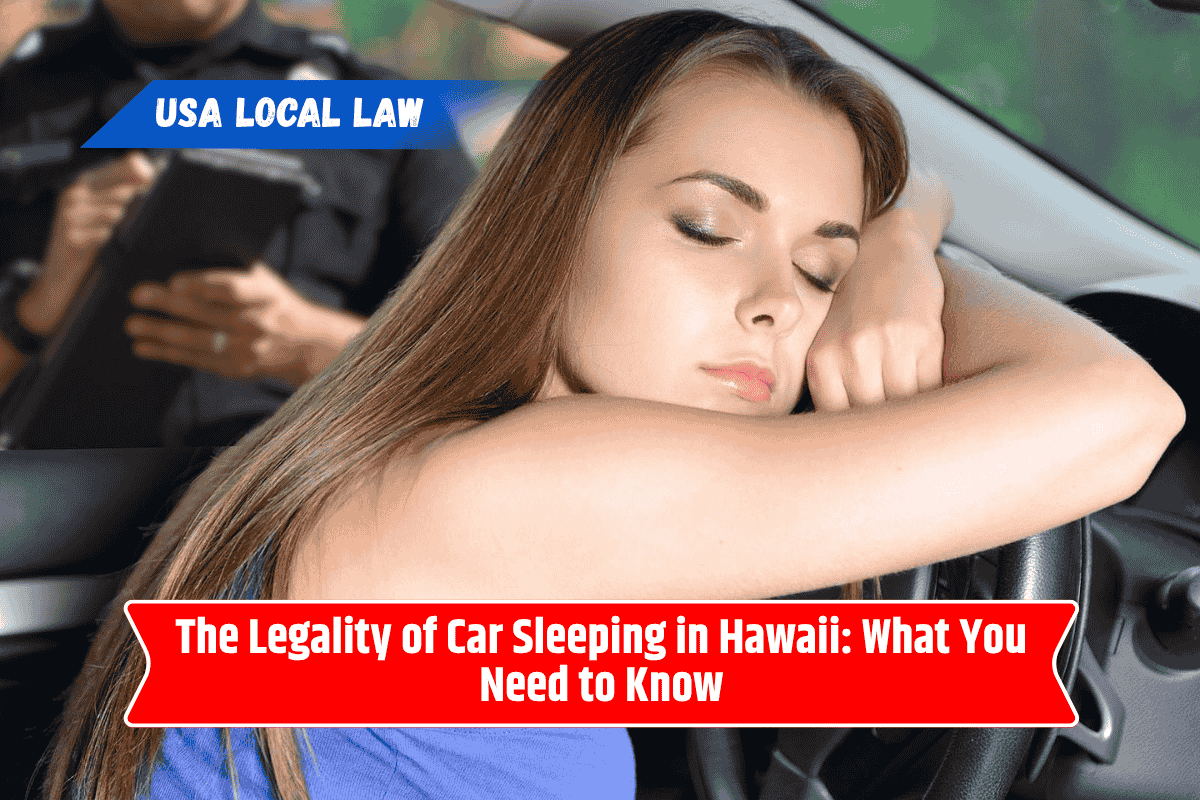If you’re planning a trip to Hawaii or you’re a local trying to save money, you might wonder whether it’s legal to sleep in your car. While Hawaii offers stunning views and tropical weather, sleeping in your vehicle overnight isn’t as easy as it sounds.
Many travelers and even some residents choose to rest in their cars due to the high cost of hotels or rentals, but Hawaii has strict rules about it. In this guide, we explain everything you need to know about car sleeping laws in Hawaii—what’s allowed, what’s not, and how to avoid trouble.
Is It Legal to Sleep in Your Car in Hawaii?
The short answer is no, sleeping in your car overnight in public areas is generally illegal in Hawaii. Local counties have specific ordinances that ban living or sleeping in vehicles on public property. This includes beach parks, roadside areas, residential neighborhoods, and most public parking lots.
In Honolulu (Oʻahu), Maui, Kauaʻi, and the Big Island, local laws make it illegal to use a vehicle as living quarters between 6 p.m. and 6 a.m. in most public spaces. Violating these laws can result in a fine, and in some cases, your vehicle could be towed.
Why Are There Laws Against Car Sleeping?
Hawaii has one of the highest rates of homelessness in the U.S., and these laws aim to reduce long-term vehicle dwelling in public areas. Officials say the restrictions help keep neighborhoods safe and prevent public spaces from being turned into makeshift camps.
However, these laws can also affect tourists or people just looking for a place to rest for the night. That’s why it’s important to understand the local regulations before parking for the night.
Are There Any Legal Places to Sleep in Your Car?
While public spaces are mostly off-limits, private property is a different story. If you have permission from the owner, you can legally sleep in your car on private land. Some examples include:
Campgrounds that allow overnight parking
Private farms or lots with owner’s approval
Businesses that offer overnight parking (like some Walmarts or truck stops—though these are rare in Hawaii)
Some paid campgrounds on the islands may allow vehicle camping, but you’ll need to check with each site and get a permit. For example, some state or county parks offer designated camping spots that may allow sleeping in your vehicle—but only with proper permits and during specific hours.
Tips If You Plan to Sleep in Your Car
If you’re thinking about sleeping in your car while in Hawaii, here are a few things to keep in mind:
Always check for “No Overnight Parking” signs. These are common near beaches and parks.
Avoid parking in residential areas—residents often report unfamiliar vehicles to the police.
Use public restrooms during open hours and clean up after yourself to avoid complaints.
If staying on private land, always get permission and don’t assume it’s okay to park overnight.
Look into hostels or cheap rentals as alternatives if you need more flexibility.
What Happens If You Get Caught?
If you’re caught sleeping in your car in an area where it’s not allowed, you may be:
Given a warning or citation
Fined (usually $35 to $100, depending on the island)
Asked to leave the area immediately
In some cases, your car may be towed, especially if it’s blocking traffic or parked illegally
Most enforcement officers try to be understanding, especially with tourists, but they are strict about repeat offenses. It’s better to avoid the risk altogether by planning ahead.
Sleeping in your car in Hawaii may sound like a cheap and adventurous idea, but local laws make it complicated and often illegal in public places. While it’s not allowed on most streets, parks, or beach areas, it’s still possible if you find private land or campgrounds that allow it.
To stay out of trouble, it’s important to research your options and get the right permissions. Understanding the local rules will help you enjoy Hawaii safely and peacefully—without unexpected fines or stress.
